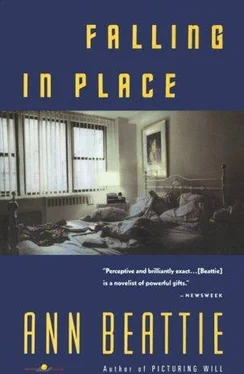Ann Beattie - Falling in Place
Здесь есть возможность читать онлайн «Ann Beattie - Falling in Place» весь текст электронной книги совершенно бесплатно (целиком полную версию без сокращений). В некоторых случаях можно слушать аудио, скачать через торрент в формате fb2 и присутствует краткое содержание. Год выпуска: 1991, Издательство: Vintage, Жанр: Современная проза, на английском языке. Описание произведения, (предисловие) а так же отзывы посетителей доступны на портале библиотеки ЛибКат.
- Название:Falling in Place
- Автор:
- Издательство:Vintage
- Жанр:
- Год:1991
- ISBN:нет данных
- Рейтинг книги:4 / 5. Голосов: 1
-
Избранное:Добавить в избранное
- Отзывы:
-
Ваша оценка:
- 80
- 1
- 2
- 3
- 4
- 5
Falling in Place: краткое содержание, описание и аннотация
Предлагаем к чтению аннотацию, описание, краткое содержание или предисловие (зависит от того, что написал сам автор книги «Falling in Place»). Если вы не нашли необходимую информацию о книге — напишите в комментариях, мы постараемся отыскать её.
Falling in Place — читать онлайн бесплатно полную книгу (весь текст) целиком
Ниже представлен текст книги, разбитый по страницам. Система сохранения места последней прочитанной страницы, позволяет с удобством читать онлайн бесплатно книгу «Falling in Place», без необходимости каждый раз заново искать на чём Вы остановились. Поставьте закладку, и сможете в любой момент перейти на страницу, на которой закончили чтение.
Интервал:
Закладка:
“Do you wish you worked in New York?” he said.
“Why do you ask that?”
“I thought you might.”
“Sometimes,” she said. “Sometimes I like it here. I think I’m lucky that we have enough money that I don’t have to work and that when the sun is shining and I’m feeling pretty good, I can go meet a friend and have a picnic and pick strawberries. It’s a pretty nice life.” She came to a full stop at the stop sign, then went slowly forward about twenty feet and stopped again, where she could see. “I don’t know what kind of a job I could get anyway,” she said.
“Tiffy’s got a job.”
“Tiffy has a Ph.D. and teaches at NYU and will probably be booted out before she gets tenure, on general principles.”
“Couldn’t you be a teacher?” he said.
“What’s this? You’re trying to send your mother off to work?”
“Just if you wanted a job,” he said. “You could get a job.”
“Thank you,” she said. “Seriously. I’m glad you have faith in me.”
While he wasn’t looking, a little dog ran across a lawn close to the car, and she said, “I wish I had had a job when Mr. Blue died. I don’t know why I took it so hard, but to this day it’s all I can do to look at a dog that reminds me of Mr. Blue in any way. That one was nothing like him — just the way it was having fun, running across the lawn after something.”
“I was talking about the cats to Parker. He said his mother told him to drown them.”
“You shouldn’t talk about that,” his mother said. “He’s going to a psychiatrist. Things like that you should probably leave to the two of them to talk about.”
“Yeah, but you don’t even think he should tell the truth?”
“I think he’s embarrassed the story got around. I don’t know how it did. I think his mother told some people. I think part of Parker’s problem is that his mother is more interested in everybody else than she is in her own son.”
“Yeah, but he said it was an alley cat.”
Louise laughed. “A two-hundred-dollar chocolate point,” she said. “That’s crazy, too: his mother paying that kind of money for a cat, and then having it put to sleep. It wasn’t the cat’s fault that he tried to go after it and the kittens. You’d think at least she would have tried to find a good home for it.”
“She’s pretty strange, too,” John Joel said.
“Everybody is, I guess. Everybody has their little secrets and their little half-truths. All those people at lunch in New York hedging and dodging like football players.”
“I know something about her even she doesn’t know,” John Joel said.
“About Parker’s mother?”
“Yeah. I shouldn’t tell.”
“How could you know something she doesn’t know?”
“Promise you won’t tell?”
Louise shrugged. “I can’t imagine what I’d find out about her that I’d care about. All she does is play tennis, anyway. Does it have to do with her tennis game?”
“No. It’s that Parker put a pinhole in her diaphragm.”
Louise snapped her head around to look at him. “What did you say?” she said.
He blushed. Parker had had to explain to him what it meant. Now he knew what it meant, and he was suddenly embarrassed to have mentioned it. He should have told her, instead, about the naked plaster people in the museum.
“What?” she said again.
“Parker did it. With a pin.”
“Parker said he did it. Parker wouldn’t do that, would he?”
“Sure,” he said. “Parker’d do it.”
She was still staring at him. “You realize—” she began.
“I know,” he said, and shrugged. “Parker thinks it’s a real good joke. He says it’s her fault if she doesn’t check.”
“But that’s awful,” she said.
“Parker found it. It was in her top drawer. He thought it was a big compact. He opened it and didn’t see any mirror, and then he found out later what it was, and he pricked a hole in it.”
“She’ll see it, won’t she?” Louise said. “Does Parker think that’s funny? She’d never dream Parker would find her diaphragm and do that.”
“She ought to. He’d do anything.”
“What do you mean?” Louise said. “Has he done something worse than that?”
“He just does strange stuff. What I told you about the ticket stubs isn’t exactly the way it happened. He burned them, on the sidewalk outside the train station. He does stuff there’s no point in doing.”
“He’s very disturbed.”
“He’s no friend of mine,” John Joel said.
“But honey — are you sure about that other thing? Mightn’t he just brag that he’d pulled a stunt like that but not really do it?”
“No,” John Joel said. “He’d do it. He wouldn’t care.”
“Imagine Georgia having another little monster like Parker,” Louise said. She brushed her hair out of her face. “I didn’t know you knew what a diaphragm was,” she said.
He blushed again, looked out the window. “I knew,” he said.
“But that’s just horrible” she said. “Parker’s a monster.”
“He rolls cigarettes like they’re joints, but they’re not. He carries them in the pack with his Salems and he smokes them going down the street with his hand cupped around them and he drags on them funny, like they’re joints. He smokes a pack a day of real cigarettes.”
“You don’t smoke with him, do you?”
“He’s no friend of mine.”
“But do you?”
“No,” John Joel said. He was embarrassed that he didn’t, that he wasn’t lying to her. He didn’t know why he’d told her so much. He slid forward in the seat and looked out the window, as they pulled into Tiffy’s driveway. There were day lilies, very tall, falling forward into the driveway, and there were daisies and tall electric-pink phlox. Tiffy’s husband was working in the garden, staking a rosebush. He waved with a pair of pruning shears.
“Hi,” Louise said, getting out of the car. “Tiffy inside?”
“She’s in the garage,” he said. “Hi,” he said, pointing the shears at John Joel.
“Hi,” John Joel said.
“Hi, Tiffy,” Louise called. Tiffy came out of the garage, wiping her forehead on her arm. She had her hair in braids, and for a second that made her look, to John Joel, a little like Nina, in New York. She had on white shorts, and a white halter top, and she was carrying a plant she had just repotted. “I have to take a quick shower and then I’m all ready to go,” she said. “Come inside where it’s cool.”
They followed her into the house. Louise pulled out a chair and sat at the kitchen table. John Joel pulled out a chair for himself and sat down. The shorts were cutting into his thighs. It smelled like chicken in her kitchen, and he looked at the clock to see how close to lunchtime it was. It was noon. If he were home, he could be eating.
“There’s wine in the fridge,” Tiffy called downstairs. The water went on in the shower.
Louise didn’t get up. “Do you want a Coke if she has one?” she said. He shook his head no. He wanted a Coke, but he wanted more to get out of the house. He wanted to pick the berries and have the picnic and have it over with. The magazine on the table wasn’t worth looking at: The New Republic . All Tiffy’s cups were pottery, and Coke tasted funny in cups like that. He thought about the milkshake he had bought Parker and wished he had his money back.
Louise got up and took a blue pottery cup down from the shelf over the sink and went to the refrigerator. She poured wine into her cup from the jug and put the jug back in the refrigerator. Tiffy’s refrigerator was always interesting: It was filled with colors instead of with wrapped packages: apples loose on a shelf, peaches, limes and lemons, pale-sea-green bottles of Perrier, orange juice in a glass bottle so that you could see the deep-orange color. Tiffy was hollering something from upstairs, but they couldn’t tell what she was saying.
Читать дальшеИнтервал:
Закладка:
Похожие книги на «Falling in Place»
Представляем Вашему вниманию похожие книги на «Falling in Place» списком для выбора. Мы отобрали схожую по названию и смыслу литературу в надежде предоставить читателям больше вариантов отыскать новые, интересные, ещё непрочитанные произведения.
Обсуждение, отзывы о книге «Falling in Place» и просто собственные мнения читателей. Оставьте ваши комментарии, напишите, что Вы думаете о произведении, его смысле или главных героях. Укажите что конкретно понравилось, а что нет, и почему Вы так считаете.












